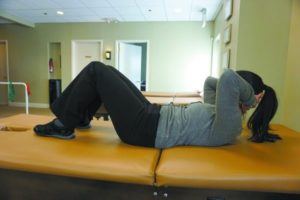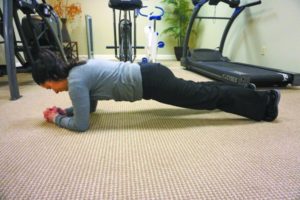A crunch might be the most common abdominal exercise, but it fails to accomplish the two most common goals of abdominal work: protecting the lower back from injury and toning your mid-section. If you can perform one single crunch, you have a six pack. Whether you can see it, is a matter of body fat. Decreasing body fat is a function of cardiovascular exercise and sound nutrition, neither of which is addressed by crunches. Crunches may enhance the appearance of your rectus abdominus, but this comes with some risk.

Crunch
To understand the risk, let’s talk about your core – which is designed to stabilize the spine. Comprised of the transversus abdominus and deep extensors, these muscles act to minimize movement of your spine. Crunches and pelvic tilts require flexion of the spine (think of slouching in front of the computer): the antithesis of stability! Repeated flexion of your spine places stress on your vertebral discs and ligaments. Over time, such cumulative stress can increase your risk for lower back injuries.

Plank
Exercises like planks and side planks properly emphasize stability of the spine. You can even work your core by keeping your stomach firm while performing other exercises, such as push-ups or rows. The difference is that your ability to keep your stomach tight should be the rate limiting factor for these exercises. For example, if you can perform 15 push-ups with good form, you are doing a great job of strengthening your pecs and triceps. However, if you want to focus more on your core, you would perform only as many push-ups as you can with your stomach tight. If you feel your stomach fatigue at seven reps, the exercise is done because you have fatigued your core. Bottom line: There are worse things you can do to your spine than crunches, but if your goal is to work your core or decrease your risk of lower back problems, you can do far better than a crunch.
Matthew Marucci, PT, MSPT, OCS, CSCS, is Chair, Hudson Valley District NYPTA, and owner of New Castle Physical Therapy & Personal Training. www.newcastlept.net







